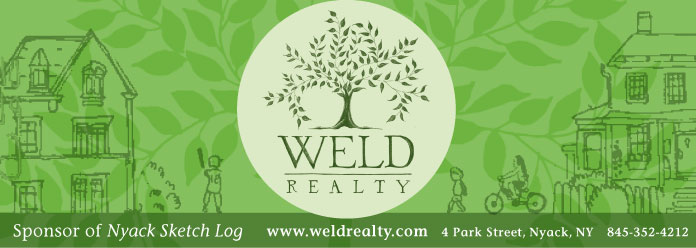Nyack Sketch Log: Maria Luisa
August 6, 2014 by admin
Filed under Choosing Lingerie
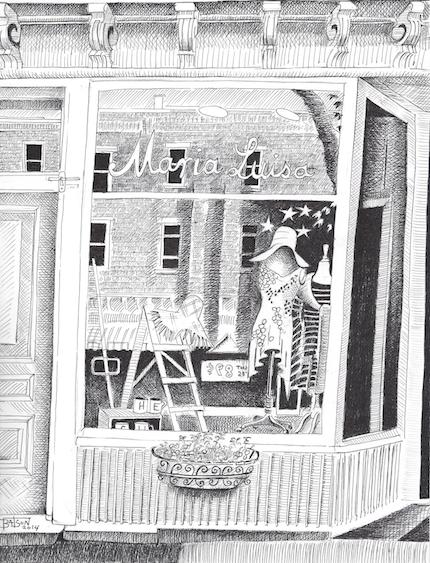 by Bill Batson
by Bill Batson
Maria Luisa Whittingham is a civic seamstress. She weaves business, social responsibility and family into a garment of retail longevity. From the durable and colorful threads of a matriarchal tradition and her own raw talent, she has created a popular business and brand: Maria Luisa.
Later this August or early September, a renovated ML by Maria Luisa boutique will open its doors at 75 South Broadway. Here is the global back story of a local fixture.
Where did you learn the merchant tradition?
My first experience with the merchant tradition was very early on in my life. My mother, Carmen Mercedes Colon de Perez, had a bazaar in Cayey, Puerto Rico. I grew up exploring the back rooms and looking under the cases of her general store.
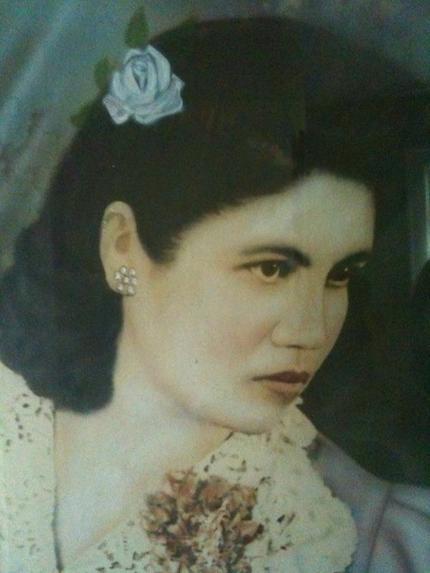
Carmen Mercedes Colon de Perez
She started the store when she was in her 20s. She had an eighth grade education. When her mother died, she had to go to work and help the family as the eldest. She worked for a department store as their bookkeeper and manager.
When she opened her own store, she carried everything from soap to thread to handbags to dresses.
So your mother was your mentor?
She was my hugest supporter. She was definitely my mentor. For someone with little opportunity, she really maximized what she had. Later in her life, as a stay-at-home mother, she sewed. She was also a great seamstress.
I would sit under her sewing machine and take her scraps and sew. No lessons. I would just get a needle and thread and sew clothes right onto my dolls.
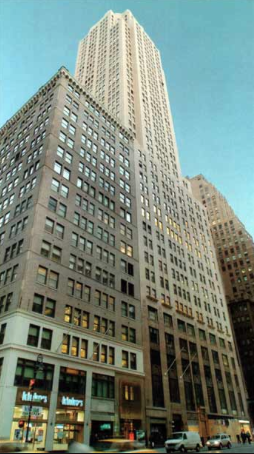
The Coat Building
When we moved to the states in 1967, I was in fifth grade. I started sewing my clothes and by middle school, classmates were paying me $15 dollars to embellish their jeans. There was no fashion program at Hillcrest High School in Queens, so they combined art and home economics for me. I was able to produce products as part of my program.
At the end of my senior year, one of my teachers, Mrs. Clara Steiner, was so supportive, she scheduled a fashion show with students as models. I went on to the Fashion Institute of Technology.
What was your first job in fashion?
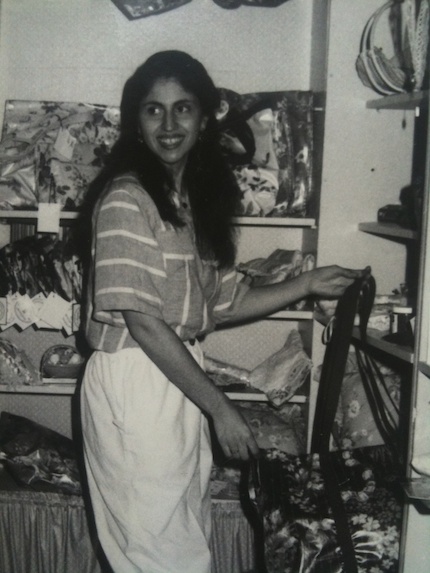
Maria at her first store on 37 South Broadway
The first job I had was with London Fog. I was doing rain coats. One of my professors, Mary Ann Ferro, worked there and recommended me. I went to work at 512 Seventh Avenue, the coat building.
The coat building?
Yes, it was the coat building, outerwear, coats and suits.
I was the first employee hired out of college. I was there for two or three years. I was the assistant designer. Two of the coats I worked on made it big in the line. One became a best seller, the Freddie. It is so cool when you are standing on the subway platform and you see the coat you designed. It is really exciting.
My next stop was an independent company that designed and produced ice skater outfits. It was interesting and fun. I met a lot of good people there.
Then I went to College Town, a company that was similar in scale to London Fog. It was a big company out of Baltimore. At around this time, I had my son Christopher, and my division at College Town folded so I started working freelance.
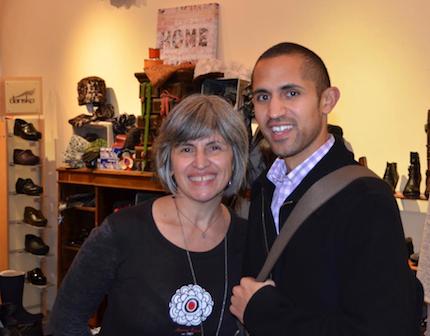
Maria and her son Christopher
Around this time, I went for my physical. My doctor got very serious and he said, “I want you to go have this test, Its probably nothing at all I concerned about a lump on your ovaries. It’s probably nothing at all, but I am concerned.”
That was the first time I felt mortality, as such; not as a document that says I am going to live a long time, and I can turn in when I am old and it’s time to go. I saw that death can happen at any time. It turned out to be nothing. But it shook me to my core. I had a little baby.
So I went out and bought life insurance. I respected my parents, but I didn’t want to live their lives of always wanting more and having less than I needed. I realized I couldn’t wait.
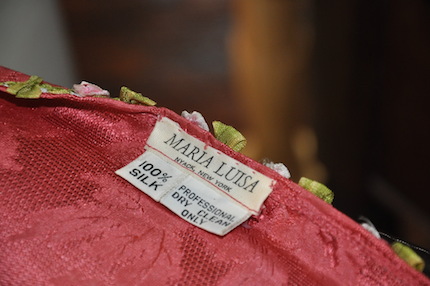
Maria’s first label
Is this when you launched Maria Luisa?
I had been writing business plans that went nowhere. But after that appointment, I jumped at it. I saw a little spot when visiting Nyack from Monsey, where I lived at the time.
Where was your first store?
I started downstairs in the mall next to the YMCA in 1987. I started with $2k. I was 30 years old. Everything I sold, I made. I fashioned ribbons into belts, I made silk blouses, lace lingerie. It was half the size of my current back room. I had a friend who I used to ride the bus with. She had beautiful jewelry from France and fabrics that I bought to make my line.
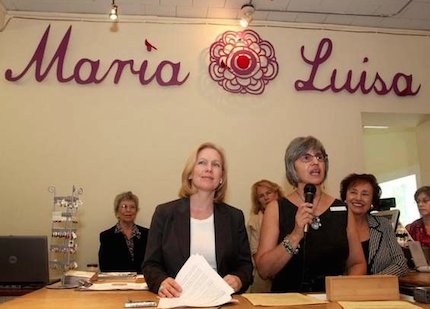
with NY Senator Gillibrand supporting small business tax incentives
After two moves inside of the mall at 37 South Broadway, I took the leap and opened on the corner of Burd and South Broadway where I stayed for 21 years, until I moved to my current locations at 77 and 75 South Broadway.
What was the business climate like in Nyack in 1987?
I started at the bottom of a business cycle, right after a market crash. I had no major money to lose. I still had a job. At the time, I was freelancing for Putumayo. I was doing all of their technical specifications for India.
Talk the talk
Walk the walk
Bag the bag
Maria Whittingham serves on the boards of Nyack Center, Rockland Country Day School, The Arts, Crafts and Antique Dealers Association (ACADA), the Nyack Marketing Association, and has co-chaired the annual dinner for the Nyack Branch of the NAACP for the last eight years.
When it comes to social responsibility, Maria not only walks the talk, she also engages her customers, employees and fellow merchants in collaborative action.
Last year, Maria stated the “Say No To The Bag Campaign.”
Here is the pledge she invites us to join:
If you agree with me about the need to reduce our disposable-bag consumption, will you join me to “Say No to the Bag”? By choosing to, as a consumer to bring a bag with you not just when at the food market but when heading out for supplies, take-out food or fashion shopping. Please go to our ‘SAY NO TO THE BAG’ and take the pledge.
-As a merchant, employee or volunteer in a retail setting, I pledge that I will always ask “Did you bring your own bag today?” If the answer is no, I will then ask “Will you need a bag today?”
-As a consumer, I pledge to bring a bag when shopping.
Since I started at the bottom, I have always enjoyed growth. I had growth through a good number of years. Then came 9/11. It was a wake up call.
How did things change?
After that tragedy, I had to become smarter about how I bought, how I did business. When things are good you can afford to do a little of this, and a little of that. Today, there is no margin of error. You are already leaning on the negative. You can’t make mistakes.
In the business climate of the last five years, you have to be constantly on the go, on the move. It’s like being on an obstacle course. Everything is in flux.
I hear that you are participating in trade delegations to other countries.
I went to Peru last year for the first time. A representative of the Peruvian government walked into the store and invited me to join a trade delegation.
There have been two trips to Peru. My work is with communities in Lima and Ayacucho. I will be going back again soon. I have developed a group of bags that were well received that will arrive in September. They look like pillows, but are interpreted as bags. I use one all of the time.
Tell me about Maria Luisa Global/Local?
ML G/L is something that has been stirring in my mind for a few years. It has always been important for me to maintain a commitment to trade fairness and to the environment.
Through ML G/L we provide merchandise that empowers globally and locally. I purchase items that empower women in a village in Africa, or Latin America, or Asia, or a community here in the United States. If you ask us about an item, we should be able to tell you everything about it. Not just what it’s made from and where it was made, but also about the integrity of the labor and the materials that went into it.
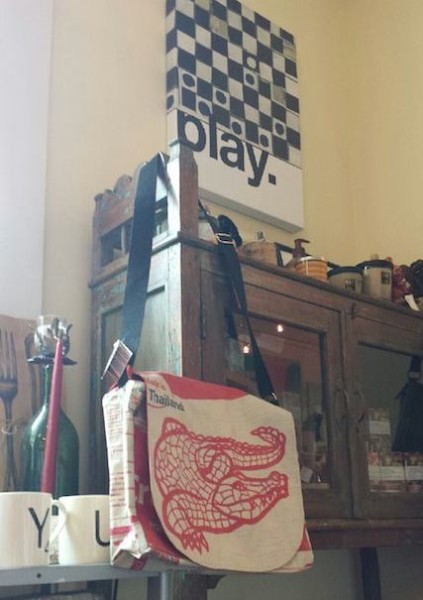
Recycled cement sack from Malia Design combats human trafficking.
Some of my vendors are not-for-profit companies like Malia Designs, that use the profits from their sales to reduce human trafficking around the world. The products that they make use already existing materials that are made by communities that are getting empowered also by crafting the product. One example is a bag made from recycled cement bags made in Cambodia.
Eventually, when you purchase a product from ML G/L on our website, you will be abe to direct a portion of the proceeds to a local non-profit like Nyack Center or the Martin Luther King Center. Collaborative. ML G/L is a way to give back locally, while supporting communities globally.
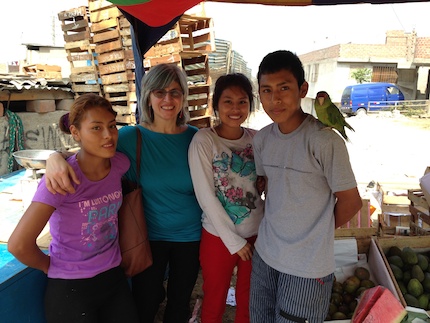
Maria in Peru
For the last two years, you have sponsored the weekly Local Arts Index column on NyackNewsAndViews. How important are the visual arts to your business?
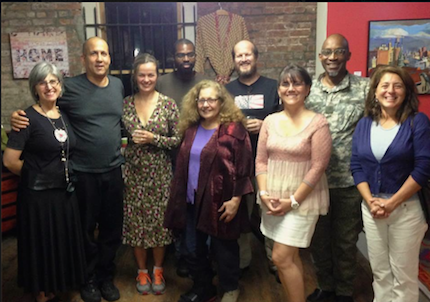
Maria hosting Local Arts Index Exhibit
Ever since I was a little girl, I have been arranging colors and textures. I remember my older sister was teaching religions instruction and she had this package of religious images that fascinated me. My mother was so ecstatic because she thought I was going to be a nun. But I didn’t see them as religious images, I just saw them as incredible works of art.
Visual arts and aesthetic are critical to everything I do. They are the air I breathe and the substance of who I am.
What is next for Maria Luisa?
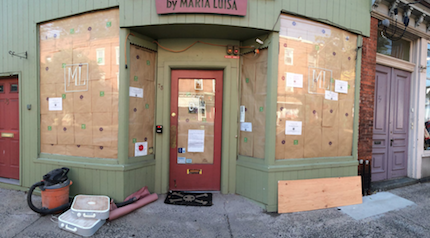 We are fine tuning and simplifying. We have an opening coming soon. In late August or early September, when 75 South Broadway is unveiled, it will be an invitation for the community to share their ideas about design and their ideals about commerce. I want to secure a sustainable global importing business that promotes an approach to local philanthropy that is supported by an engaged community.
We are fine tuning and simplifying. We have an opening coming soon. In late August or early September, when 75 South Broadway is unveiled, it will be an invitation for the community to share their ideas about design and their ideals about commerce. I want to secure a sustainable global importing business that promotes an approach to local philanthropy that is supported by an engaged community.
Maria Luisa Boutique and ML by Maria Luisa are located at 77 and 75 South Broadway in Nyack. You can learn more by visiting marialuisaboutique.com
Each Saturday, Marai Luisa sponsors Local Arts Index on NyackNewsAndViews.
An activist, artist and writer, Bill Batson lives in Nyack, NY. Nyack Sketch Log: “Nyack Sketch Log: Maria Luisa“ © 2014 Bill Batson. Visit billbatsonarts.com to see more.
